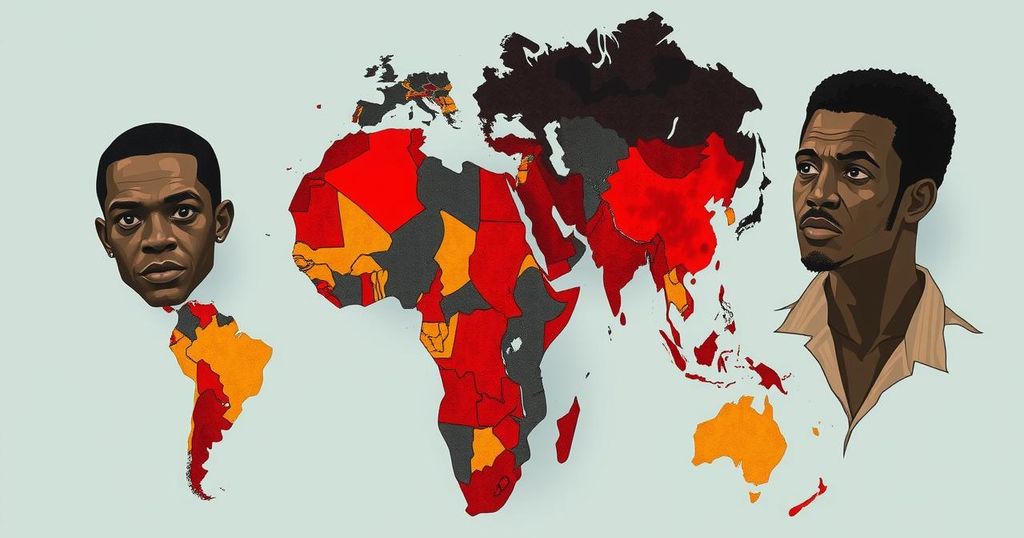Electoral Transformations in Africa: Voter Sentiment Against Ruling Parties

Recent elections across Africa have led to significant shifts in political power, with voters rejecting incumbent parties due to economic mismanagement and corruption. In Ghana, former President John Dramani Mahama won a landslide victory, while Botswana’s ruling party faced a historic defeat. This trend is seen across the continent, with younger voters increasingly demanding accountability and responsiveness from their leaders, indicating a transformative political landscape.
Recent elections across Africa have demonstrated a significant shift in political power, with voters in several countries decisively rejecting incumbent parties. In Ghana, supporters of the National Democratic Congress (NDC) erupted in jubilation following former President John Dramani Mahama’s remarkable victory over Vice President Mahamudu Bawumia of the ruling New Patriotic Party (NPP). Mahama’s landslide win, which involved a staggering gap of 1.6 million votes, highlights a broader trend of discontent with ruling parties due to economic challenges, governmental corruption, and unfulfilled promises.
This trend is not isolated to Ghana; in nations from Botswana to Senegal, voters have demonstrated a willingness to remove long-standing ruling parties. The ruling Botswana Democratic Party (BDP) faced a historic defeat in November, marking the end of nearly six decades of governance as opposition forces triumphed decisively. Similarly, major shifts were noted in South Africa, where the African National Congress (ANC) lost its parliamentary majority for the first time in three decades, signaling a considerable public disillusionment with its handling of economic issues.
Further complicating the political landscape, younger voters are increasingly dissatisfied with established parties, especially in contexts where legacy issues from colonialism and apartheid are less relevant. This generational divide reflects a growing demand for accountability, economic growth, and the eradication of corruption among political leaders. Iraq temporary sentiment due to COVID-19 related corruption scandals has further fueled public anger across many nations, including Mauritius and Mozambique, resulting in protests and electoral shifts.
The recent electoral outcomes affirm a significant evolution in democratic engagement within the continent. Experts assert that these developments reflect a growing elation among citizens who are increasingly discerning in their voting behaviors, pressing governments to address their grievances or face the consequences in elections. Political analysts suggest that this momentum may continue to shift political landscapes in upcoming elections across the continent, fostering a more responsive and accountable governance system.
The electoral landscape in Africa has been undergoing notable transformations as citizens express dissatisfaction with ruling parties due to economic mismanagement, corruption, and unmet policy promises. Recent elections have illustrated a pattern in which voters are opting for opposition parties and showcasing a significant lack of faith in incumbents. This has been particularly evident in nations such as Ghana, Botswana, South Africa, and Senegal, wherein established parties that once held significant power have experienced unprecedented defeats. Analysts emphasize the role of younger voters, who are increasingly influential and less tied to historical narratives that may once have bolstered these parties. The rise of new political dynamics, particularly in response to recent socio-economic challenges like inflation and corruption scandals during the COVID-19 pandemic, positions these elections as critical for the future democratic integrity across African nations.
In conclusion, the shift in political power across African countries during recent elections reflects a growing trend of citizen dissatisfaction with long-standing ruling parties. With economic challenges and corruption becoming pivotal factors influencing voter behavior, it is clear that electorates are demanding greater accountability from their leaders. The rise of opposition parties and the active engagement of younger voters indicate a potential for further significant political transformations within Africa. As nations prepare for future elections, the lessons from these recent electoral shifts may serve to encourage politicians to adopt more responsive and responsible governance strategies.
Original Source: www.aljazeera.com




